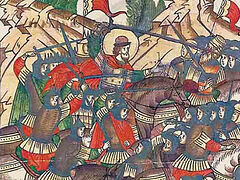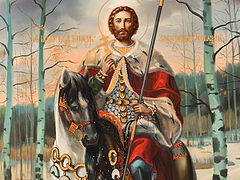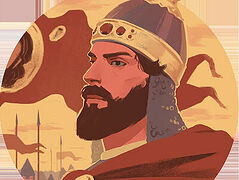The events of recent years have shown that we have lost a great deal. We have forgotten how to live according to the laws of our ancestors, in the Christian spirit—as God commands us and as the Holy Church teaches us. We have lost the old foundations and the continuity of the traditional way of life, and we must restore it if we do not want spiritual and moral degradation and degeneration. Among the many tasks that Russian society faces today the most important one is the restoration of the historical memory of the people, the Orthodox faith and the values, the ideals, the moral guidelines, the national popular traditions in public, family life and in the upbringing of children that are associated with the faith.
The main problem for Russia today is educating the younger generation. This priority is recognized by teachers, parents, the Church, public and Government figures; but there are very, very few salutary and effective steps due to the lack of unanimity among adults who are called to provide a decent upbringing.
To educate a spiritual and moral personality means to find in it support for the future family, church community, professional team, the State and society. And here we cannot do without the continuity of the national ideals—ascetics and strugglers for piety, who are models of holiness, patriotism, valor and honor. For many centuries, for our fellow-countrymen one of the most brilliant examples of this has been the holy Right-Believing Grand Prince Alexander Nevsky, a descendant and heir of the legendary princely Monomakhovich family. This family gave Russia fifteen of eighteen grand princes and twenty saints. This family not only embraced Orthodoxy, but also absorbed to the fullest the Christian way of life and understanding that political power means serving God, your people and it has nothing from itself. It was the Monomakhovich family who began to effectively form the idea of a unified Orthodox state in Russia.
The holy Right-Believing Grand Prince Alexander Nevsky has served as an image of holiness for our fellow-countrymen for many centuries. From that tragic era, it is hard for us to find similar examples of such a consistent feat of life, since the Right-Believing Prince Alexander most fully combines service to God, to Orthodoxy, and to his people.
What was St. Alexander Nevsky’s immortal feat and good example? Why did he become a national hero of Russia, an outstanding grand prince, a wise politician and diplomat, a brave military commander and a glorious saint of the Orthodox Church? What were the paths of his earthly life, which, according to historians, was “between the hammer and the anvil”? We can answer these questions only by studying the evidence in ancient chronicles, Lives and other sources thoroughly.
Prince Alexander Yaroslavich lived on this earth only until the age of forty-three (1220–1263). At first, he ruled the land of Novgorod, where he defended Novgorod and Pskov, and from 1249 he became the Grand Prince of Vladimir, the leader of all Russia. Alexander ruled the country during the very difficult time of the Tatar-Mongol yok—when the German, Livonian and Swedish Catholic orders of knighthood to the west and to the north had risen up against Rus’. He became famous as a wise politician and an exceptionally talented military leader, who was admired even by his enemies.
In late November, 1263, on his way back from the Horde he died in Gorodets on the Volga River, having taken monastic vows (he took the schema with the name Alexei) before his death. Upon learning of the prince’s death from a messenger during the service, Metropolitan Kirill said from the ambo of the church: “My children, know that the sun of the Russian land has set.” And then miracles started to occur, signifying that an extraordinary man had ended his life’s journey. And a Russian chronicler wrote down the following words: “God has glorified His saint, who has worked hard for our land and given up his life for Novgorod and Pskov, for the whole of the Russian land, and for Orthodox Christianity.”
From St. Alexander Nevsky’s life we see what moral height and strength Christian duty and civic responsibility reached in him. The modern world, including Christians, is sick with the “paralysis” of irresponsibility. Irresponsibility is shameful and disgusting in all areas of human life. But All aspects of public and family life are permeated with irresponsibility today.
The Russian philosopher Ivan Ilyin once wrote that due to the decline of spirituality, the inability to have a living religious experience, “the sense of duty and responsibility in humanity has been shaken. The spirit is creative energy; it is natural for it to impute to itself what is being done and to answer for what has been done. This feeling is the surest sign of spirituality.”
Anyone can become an ascetic, a saint and attain the level of great saints, if only they want it with their whole being. Many have read the answer of St. Seraphim of Sarov to the question: “Why are there no miracles now like those performed by ancient Christians?” The venerable father replied: “Because people do not have the same resolution and zeal to please God and serve Him as before.” In this context, the concepts of “resolution” and “responsibility” are closely intertwined.
His entire life can be compared to an icon, an image, in accordance with which the rulers of Russia and its defenders should build their activities. The icon of St. Alexander Nevsky at St. Alexander Nevsky Lavra, near the shrine with his relics, reflects four main aspects of the holy prince: the ideal leader—he is dressed in a grand prince’s robe; a defender of the faith—he shows the way to Christ; a warrior—he is dressed in military armor; and a national hero—he stands on Russian soil as “The sun of the Russian land.” This marvelous icon fully embodies St. Alexander Nevsky as a symbol of Russia.
What manner of man the ruler of the city is, such are all they that dwell therein (Sir. 10:2). The education of a personality, especially at a young age, is based on the imitation of positive examples. For all Christians the Highest Ideal is Christ. The Apostle Paul also points out the way of drawing nearer to the Ideal: In Christ Jesus I have begotten you through the Gospel. Wherefore I beseech you, be ye followers of me (1 Cor. 4:16).
The Holy Fathers of the Church recommend that we grow in the virtues, going “from strength to strength”: “It is not easy to imitate Christ right away. Imitate the good people you know first—let it be the first step. Next imitate the good people of your nation—let it be the second step. Then imitate the great saints of the Church—this will be the third stage. And finally, imitate Christ—this is a peak that cannot be reached in one bound” (St. Nikolaj [Velimirovich] of Ohrid and Zica).
By his example St. Alexander Nevsky sets forth an image of educating a whole, spiritual and moral personality—as a Christian, a family man and a citizen. These three most important components constitute general educational activity carried out in cooperation with the family, school and the Church—parents, teachers and pastors. Without their unity of mind and without ascetic work in caring for “these little ones,” the education of the whole personality is unattainable.
-
The education of the spirit is the education of a Christian, which is possible only with the participation of the Church, pastoral care for parents, children and teachers in order for them to gain unanimity, harmony and Christian love.
-
The education of a well–behaved and noble soul is the education of a family man by the grace-filled system of family life in the Christian tradition and the Church tradition.
-
The education of the body is the education of a citizen and patriot who loves his Fatherland and is able to defend it—something to which mainly young men are called —through the efforts of the State, the Church and the public school.
If parents, teachers and pastors achieve this in unanimity in the upbringing of children, making them children of God, of the Church, of the Fatherland and of parents, then everything else—education, the development of talents, health and the necessary means of life—will be added, as the Lord said in the Sermon on the Mount: But seek ye first the Kingdom of God, and His righteousness; and all these things shall be added unto you (Mt. 6:33).




